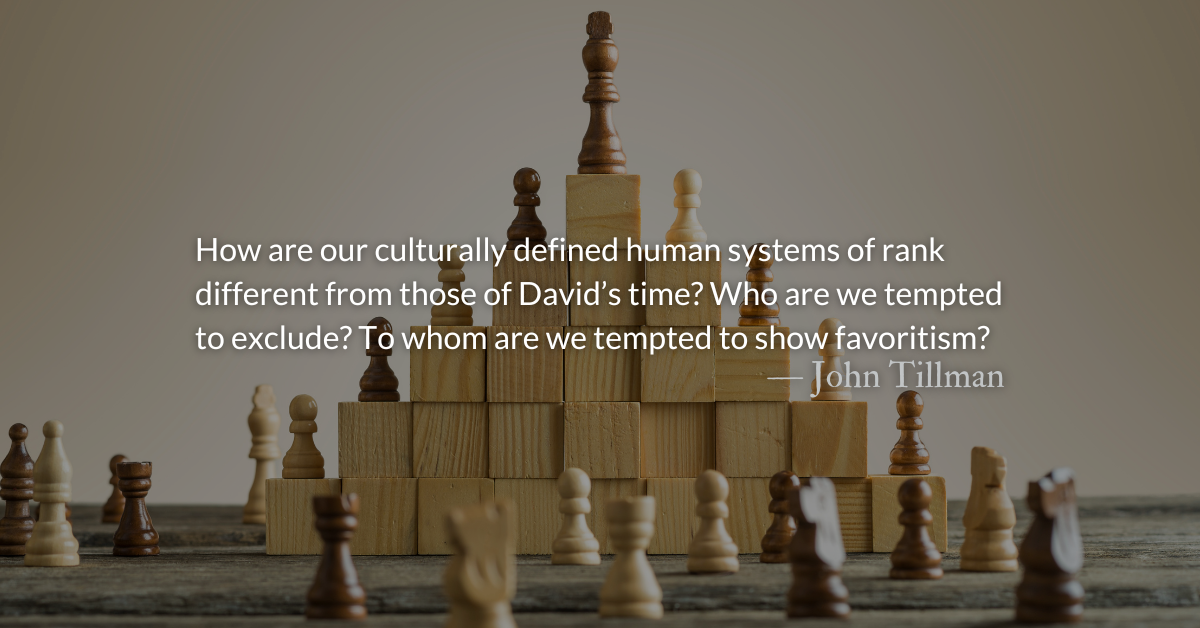Links for today’s readings:
Nov 28 Read: 1 Chronicles 24-25 Listen: (7:01) Read: Psalms 102 Listen: (2:45)
Links for this weekend’s readings:
Nov 29 Read: 1 Chronicles 26-27 Listen:(9:38) Read: Psalms 103 Listen: (2:07)
Nov 30 Read: 1 Chronicles 28 Listen: (4:45) Read: Psalms 104 Listen: (3:37)
Scripture Focus: 1 Chronicles 24.3-5, 30b-31
3 With the help of Zadok a descendant of Eleazar and Ahimelek a descendant of Ithamar, David separated them into divisions for their appointed order of ministering. 4 A larger number of leaders were found among Eleazar’s descendants than among Ithamar’s, and they were divided accordingly: sixteen heads of families from Eleazar’s descendants and eight heads of families from Ithamar’s descendants. 5 They divided them impartially by casting lots, for there were officials of the sanctuary and officials of God among the descendants of both Eleazar and Ithamar.
30 …These were the Levites, according to their families. 31 They also cast lots, just as their relatives the descendants of Aaron did, in the presence of King David and of Zadok, Ahimelek, and the heads of families of the priests and of the Levites. The families of the oldest brother were treated the same as those of the youngest.
Reflection: Biblical Fairness Requires Subverting Human Systems
By John Tillman
Chronicles describes how the work for the temple and positions of honor within it were distributed fairly, without corruption or favoritism. Remember—separation of church and state did not exist. These temple jobs, ministerial roles, and positions of influence were intimately connected to and controlled by the government.
Important work and powerful positions are normally distributed based on culturally defined human systems of rank. In David’s time, the first would be nationality or ethnicity. Non-Israelites would be excluded or pushed to minor positions. Second would be family importance or influence. How close (and loyal) one’s family was to the king would be vital. Third would be intra-family rank by wealth or birth order. The most important positions would be claimed or given to the eldest and wealthiest within the family.
David, with the help of the two highest ranking priests, at least partially subverted and undermined these systems.
Who were the first people to work on building the temple? Foreigners living in Israel. (1 Chronicles 22.1)
David assembled foreigners together and appointed stonecutters to dress stone for the temple’s foundation. (Later Solomon used forced labor, but that is not specified here.) The temple’s foundations were laid by foreigners who would be limited in accessing the completed temple. However, Isaiah later wrote that foreigners “bound to the Lord” would be included among God’s people and would “minister to him,” “love the name of the Lord,” and “be his servants.” God pledged to bring foreigners to his “holy mountain,” give them joy, and accept their offerings and sacrifices because the temple was “a house of prayer for all nations.” (Isaiah 56.3-7) This is one of the passages Jesus quoted when he cleansed the temple. (Mark 11.15-17)
What principles were used to distribute the ministerial roles in the temple? Equity and impartiality. (1 Chronicles 24.5, 31)
One priestly family was much larger, yet the positions were distributed impartially by casting lots. Casting lots was also used by the Levites, to equitably treat children of the youngest the same as those of the eldest.
How are our culturally defined human systems of rank different from those of David’s time? Who are we tempted to exclude? To whom are we tempted to show favoritism? Against whom do we hold prejudices?
David and the priests used casting lots as one means of subverting human favoritism and prejudice. What means, as Holy Spirit empowered followers of Jesus, might we use to subvert today’s prejudicial systems of favor?
Divine Hours Prayer: The Morning Psalm
Our iniquities you have set before you, and our secret sins in the light of your countenance.
When you are angry, all our days are gone; we bring our years to an end like a sigh.
The span of our life is seventy years, perhaps in strength even eighty; yet the sum of them is but labor and sorrow, for they pass away quickly and we are gone.
Who regards the power of your wrath? Who rightly fears your indignation?
So teach us to number our days that we may apply our hearts to wisdom. — Psalm 90,8-12
– From The Divine Hours: Prayers for Autumn and Wintertime by Phyllis Tickle.
Read more: Balancing Justice and Mercy
Having balanced systems minimizes the opportunity for human corruption, but doesn’t eliminate it.
Consider Supporting Our Work
End-of-year giving makes the difference in keeping our ministry funded. Whether you are an end-of-year giver or a monthly donor, your gifts are vital and we need more donors like you.


